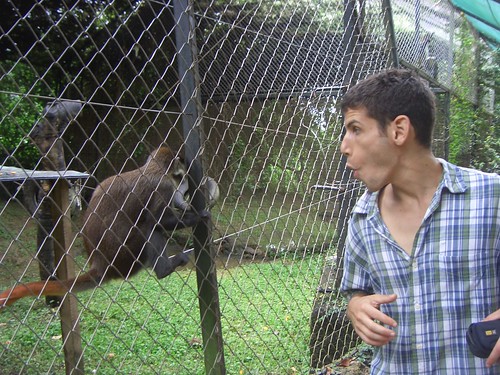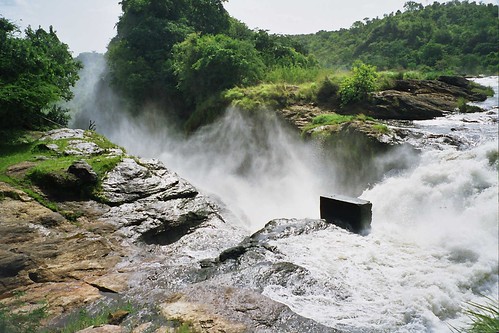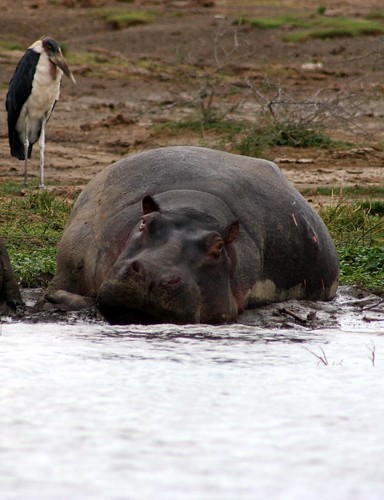My most recent Global Voices post:
While only 0.6 percent of Uganda's population are internet users, there is increasing evidence that both Internet and Communication Technology (ICT) capacity is increasing, and that it is increasing in ways that are useful and relevent to local communities.
On OpenDemocracy.net, Patricia Daniels provides an overview of this continent wide phenomenon. In Africa: tools of liberation, she concludes with a general lesson:
The conclusion is always going to be the same: for peace, democracy or development, let's leave the real decisions to the people who know what matters to them. There is plenty of existing ICT capacity in Africa, as well as the potential to continue developing it, with the right kind of support. The conclusion of the discussion that sparked this essay was right: it's empowerment not patronage that's needed.
She notes a particular ICT project in Uganda:
In Uganda, ISIS-WICCE have developed a multimedia, multi-pronged approach to bring women under the ICT umbrella. This included training, opening a women's cybercafé, collecting women's stories and basing content on real urgent needs. Working with different technology and developing partnerships (including the Women of Uganda Network [Wougnet]) created a synergy, which has had concrete results in a wider sense of empowerment. In particular, their radio talk shows on violence against women, especially war victims and refugees, raised awareness among the international community and prompted donor support to address these issues.
In An African Minute reports on the launch on an innovative IT project aimed at helping the country coming to consensus on post-conflict reconciliation issues:
Like all countries that emerge from long periods of violence, Uganda finds itself at a fork in the road. In one direction is the neopatrimonialism, tribalism, distrust and violence amongst ethnic groups that has existed since its inception as a nation (of which Joseph Kony's LRA was but one incarnation). The other direction is a society where living in certain districts doesn't completely disqualify you from adequate security, healthcare, education or economic opportunity.
Northern Uganda Peace Initiative (NUPI): A Portal for Reconciliation is space designed to discuss the multifaceted issues of Ugandan reconciliation. While none of the tools on this site are new (blog, vlog, cell phone text messaging capability), as far as I know this is the first time they have been used to help identify solutions in a post-conflict setting. Since the site will be only as good as the amount of engagement from all communities interested in reconciliation, it will be a fascinating experiment to see how useful and relevant participatory communication tools are in the developing world.
In Kampala, the X-poser covers a Makerere University video conference on Blogging and Media in Africa:
Fears for blog-sphere to wipe-out journalism took center of the discussion for some good minutes but later Abdullahi Boru from Makerere University commented that, “Blog-o- phobia has to be substituted by blog-o-mania. Journalist will not run away from the new technology instead they should do their part professionally”. Hard material like Academics and news are blogged not forgetting sensational or un-researched material. Journalism students or journalist too have to blog, but what is the impact of their blogging?
In other news, there were three important pieces written this week about some of Uganda's under-reported issues: the Karamojong conflict, regional geo-politics, and new news on Uganda's HIV/AIDS rates.
Samuel Olara reports on the undercovered continuing conflict in the northeast Karamojong region:
People rarely win wars, and governments rarely lose them. People get killed. Governments moult and regroup, hydra-headed. Civilians become hostage and victims to the actions of their own governments, which is constitutionally mandated to protect them. Such is the tragic situation that has been playing itself in the Karamoja sub-region of northeastern Uganda since President Yoweri Museveni launched his so-called “disarmament program,” which has now turned out to be a massacre of the poor Karimojong.
Head Heeb outlines the continuing disasters in the Sahel region:
And a new theater may be opening in southern Sudan, where the Machakos peace may be collapsing before the world's eyes. Since the 2002 peace accord and the installation of a national unity government last year, the south has experienced a tentative recovery and thousands of displaced persons returned to their homes. Three days ago, however, the peace was broken when a clash between government and SPLA troops in the southern town of Malakal escalated into a pitched battle in which hundreds died. The latest reports indicate that calm has returned to the city and high-level delegations are attempting to mediate, but these efforts face uncertain prospects amid the southern ethnic groups' growing discontent over their marginalization. Unless regional conciliation is extended to ethnic groups as well as governments and militias, and unless the international community makes a sustained commitment to peacekeeping and development rather than choosing sides, the Sahel conflict zone may continue to expand.
In An African Minute asks if violence in Sudan, Central African Republic and Chad have an impact on events in northern Uganda:
Of course, the conflict zone has already expanded, playing a role in destabilizing the talks between the Lord's Resistance Army (LRA) and the Government of Uganda in Juba, Sudan. The LRA this week suspended the peace talks, claiming the cessation of hostilities agreement had been violated.
Elsewhere, Jackfruity investigates America's role in a possible reversal in Uganda's famous AIDS success:
The Washington Post recently reported that the AIDS rate is rising in Uganda. Peter Piot, director of UNAIDS, attributes the increase (from 5.6 to 6.5 percent in rural men and from 6.9 to 8.8 percent in rural women) to "a period of 'decreased credibility' of condoms, the consequence of messages by some fundamentalist groups, a run of defective condoms and then a shortage of condoms."
While serious issues continue to crowd the agenda, Ugandans continue to recognize the importance of laughter despite the struggles. Ernest Bazanye, known to Ugandans as Baz, and perhaps Uganda's funniest man, writes about his recent ride of Uganda's famous boda boda motorcycle taxis:
Twice in the past seven days I have found myself riding a boda in town, something I don’t usually do. It is both unsafe and unhygienic. It is on record that the National Boda Boda Association (NBBA) tests members’ underarms and will withhold an operator’s licence if the carbon concentration levels fall below a certain level of toxicity.
Labels: east africa, global voices, ICT4D, IT for development








 Joshua Goldstein is in search of the best route to bicycle from Kampala to Capetown.
Joshua Goldstein is in search of the best route to bicycle from Kampala to Capetown.